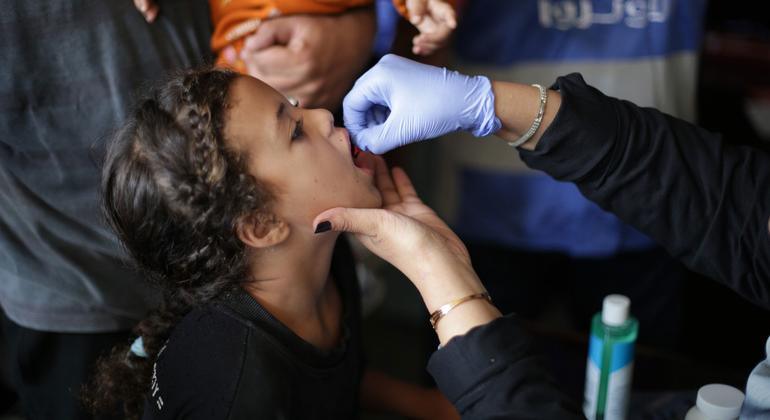Richard Peeperkorn, of the World Health Organization (WHO) in the occupied Palestinian territory, said the goal was to reach all children in the north with the second and final dose.
“We covered many more children than expected, but we missed some,” he told a video-linked briefing for journalists at UN headquarters on Monday, stressing that Evacuation orders had recently displaced thousands of people.
Yet the year-long war, combined with weeks of siege and movement orders and Israel’s constant bombing, has presented serious delays and obstacles.
Nearly 80 percent covered
Yet the United Nations agency for Palestinian refugees, UNRWA, said 79 percent of children in the northern Gaza Strip are now fully vaccinated against polio.
“Humanitarian pauses are essential to deploying this vital campaign, but without a lasting #CeasefireNow, children will continue to suffer and die,” UNRWA said on social media early Monday.
Senior UN officials have been alarmed by violent incidents reported at some of the sites where parents, their children and aid workers have gathered for the campaign rollout.
WHO chief Tedros Adhanom Ghebreyesus expressed serious concern this weekend, there were reports of attacks on a health center.
UNICEF calls on Israel to investigate
The head of the United Nations Children’s Fund (UNICEF), Catherine Russell, stressed in a statement released on Saturday evening that attacks on civilians, including aid workers and what remains of Gaza’s civilian facilities and infrastructure, had to stop.
“Combined with the horrific level of child deaths in northern Gaza following other attacks, these most recent events combine to write another dark chapter in one of the darkest periods of this terrible war,” she declared.
“The entire Palestinian population in northern Gaza, particularly children, are at imminent risk of death from disease, famine and ongoing bombing,” she warned, adding that UNICEF is calling for Israel immediately investigates circumstances surrounding attack on its personnel. member and that steps must be taken to hold those found responsible to account.
Carry out your actions in a context of conflict
The incidents occurred during agreed humanitarian breaks, in place from 6 a.m. to 4 p.m. during the three-day campaign. Eradicated from Gaza 25 years ago, polio re-emerged earlier this year amid multiple humanitarian crises triggered by the war, which began following Hamas’s deadly attacks on Israel in October 2023.
To date, Israel’s war on Gaza has killed more than 43,000 people, according to Gaza’s health ministry, and destroyed large swathes of the Strip, including water stations and health centers. .
Despite access difficulties, the Gaza Polio Technical Committee, which includes the Palestinian Ministry of Health, WHO, UNICEF, UNRWA and partners, decided to resume the campaign, which had been postponed since October 23 due to lack of security guarantees.
Early Saturday morning, 216 teams were deployed to 106 fixed sites, 22 of which were added to ensure increased availability of vaccination in areas where recently displaced people are seeking shelter, according to UN agencies.
Additionally, more than 200 social “mobilizers” mobilized communities and raised awareness about vaccination efforts.
Mission almost accomplished
The campaign in northern Gaza follows the successful implementation of the first two phases of the second cycle in central and southern Gaza, which reached 451,216 children, a total of 96 percent of the target in these areas.
To stop the spread of the easily spread poliovirus, at least 90 percent of all children in every community and neighborhood should be vaccinated, according to the WHO.
According to the UN health agency, a delay in administering a second dose of nOPV2 within six weeks reduces the impact of two cycles close together, thereby decreasing immunity.
The WHO also warned that the failure of a significant number of children to receive their second dose of vaccine is seriously undermining efforts to stop the spread of the virus and could also lead to new cases in the Gaza Strip and in neighboring countries.




